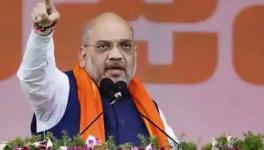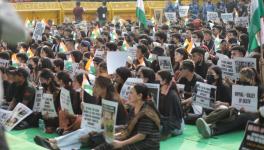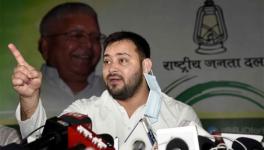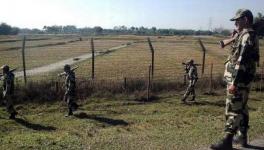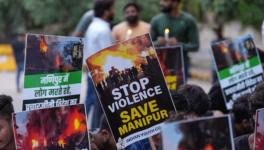Whose ‘Apni’ is This Party?
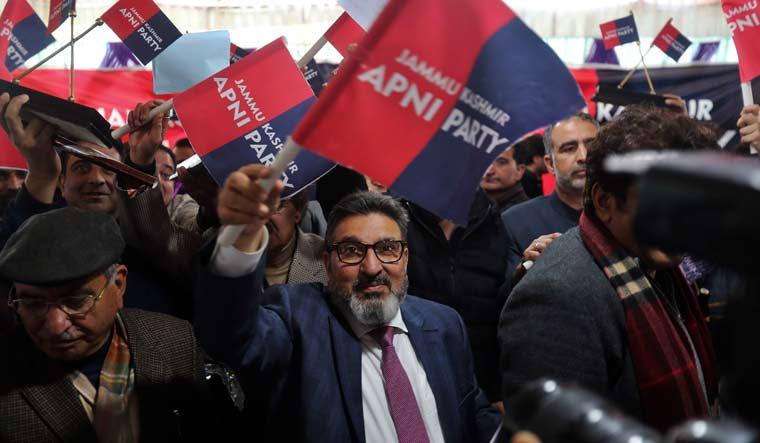
Former PDP leader Altaf Bukhari (center) waves the new party flag after launching Apni Party. Image Courtesy: AP
The formation of a new political party is generally a welcome step in any democratic setup, but in the former state of Jammu and Kashmir—now two Union territories—any ‘normal’ is abnormal and any political activity is necessarily a part of some much larger and more complex game than state-level politics. So is the case with Apni Party, the new political outfit launched in Jammu and Kashmir by former minister and ex-People's Democratic Party leader Syed Altaf Bukhari.
Unlike Shah Faesal’s Jammu and Kashmir People’s Movement or JKPM, Bukhari’s initiative did not get an enthusiastic welcome from the Valley—except for applause from Bharatiya Janata Party (BJP) leaders. This raises several questions about the real motives of this new outfit.
Who is Syed Bukhari?
Bukhari is regarded as one who liaised between rebels and New Delhi when Ghulam Mohammad Shah had hatched a successful conspiracy against the Farooq Abdullah government in 1984, with the help of then state governor, Jagmohan. However, his political career started much later, in 2005, with Mufti Mohammad Sayeed.
He came into prominence outside the Valley when it was proposed, in winter 2018, that he should head an unusual alliance—that of the National Conference, the PDP and the Congress party after the BJP had parted ways with PDP. This surprise proposal was a last-ditch attempt to avert a perceived attack on the supremacy of the Valley, but failed because facsimile machines at the governor’s office “malfunctioned”.
The selection of Bukhari had surprised many at that time. A first-time MLA from central Srinagar’s Amira Kadal constituency, he was the road and transport minister in the Mufti cabinet. After Mufti's death, his daughter Mehbooba counted Bukhari among the rebels who were close to the BJP. Thus, she did not induct him into her cabinet. However, during a cabinet expansion in February 2017, he was given charge of the ministry of education. And later, when Haseeb Drabu was unceremoniously sacked as state finance minister—for saying at a public function in Delhi that Kashmir is not a political problem—Bukhari was given the additional responsibility of finance.
It is interesting to note that Bukhari was also present at the event in which Drabu had spoken. It had been organised by the PHD Chamber of Commerce and, in fact, the event was originally scheduled to be chaired by Mehbooba Mufti, who cancelled at the last moment. Bukhari was attending as a “leading businessman”.
When Drabu made the controversial statement, Bukhari was seated on-stage and had raised no objection at all. Once back in Srinagar, he was on Mehbooba’s side and was rewarded the “additional responsibility” of managing the state’s finances. He then, apparently, earned enough faith to be declared a joint candidate of Valley parties.
One more thing needs attention. Bukhari was the richest MLA in the last Jammu and Kashmir Assembly. He declared assets in 2014 worth about Rs 86 crore, including a farmhouse, a 2,264 sq-foot flat in Delhi and commercial as well as residential buildings all over the former state—and he has seven cases under the Income-Tax Act to deal with. A graduate in agriculture, Bukhari started out with a pesticide unit and diversified his interests over time. Some in the Valley also blame quality failures in his brand of pesticides, sold under his brand, Dithane, for the ruin of apple crops in the Valley some years ago.
Kashmiris, known for their ability to nickname their leaders, call him Bukhari Dithane.
His name also surfaced in a money-laundering case and, just last year, the National Investigation Agency summoned his younger brother, Tariq Bukhari, reportedly to ask questions related to hawala transactions.
It is Bukhari’s deep pockets which are said to have played the most important role in his ride up the road of political success. A businessman to the core, he is known more for his manoeuvring acumen than ideology or loyalty. Soon after the effort by Valley parties to stake a claim to form government in Jammu and Kashmir was thwarted, by the imposition of President Rule, he was expelled from the PDP for ‘anti-party activities’.
As Mehbooba’s prospects sank, the businessman first flirted with the National Conference a little, indicating that he would support Farooq Abdullah in a parliamentary election. However, Abdullah’s National Conference did not show any interest and for some time Bukhari was away from the limelight.
The BJP was experimenting with Sajjad Lone during the state local body elections. A rumour circulating at the time in the Valley went that Sajjad may be used as a new puppet of a Delhi which is least interested in giving free and fair Assembly elections a chance.
Abrogation of Article 370: The Game-Plan
It was while everyone was awaiting the announcement of Assembly elections in Jammu and Kashmir that the BJP pulled the surprise move of bifurcating the state into two Union territories. Bukhari was among the very few political leaders who was not arrested in the immediate aftermath of snatching away statehood and abrogating Article 370. But the BJP’s love for Sajjad Lone did not last long. Soon, he, too, was put behind bars.
Considering his father Abdul Ghani Lone’s legacy, surely it must have been difficult for Sajjad to openly support the BJP and then continue his alliance with it. He has been quiet ever since his release, which people in the Valley believe is the price of his freedom. They also believe that everyone got the same offer, but neither Omar Abdullah nor Mufti have accepted it yet.
They feel that the only option available to Valley leaders is to toe the BJP’s line or remain silent and that Bukhari, willingly, chose the first.,
So while most leaders and political outfits are still unprepared to participate in the political process on these conditions, the BJP is in dire need of partners in the Valley. It needs outfits through which it can hold elections and then claim that democracy has returned to Kashmir. Yet, in view of the proposed delimitation process, it is difficult to believe that someone from the Valley will be chosen as Chief Minister by the Centre.
Considered ambitious, opportunistic and allegedly corrupt, people like Bukhari seem most suitable for this moment, as they can be controlled by both carrot and stick, says political observers.
Check out the profiles of some of Bukhari’s prominent comrades-in-arms: Mohammad Dilawar Mir, a former PDP minister, is out on bail in a corruption case. Former Congress leader Usman Majeed was once part of the infamous ikhwanies (government-supported terrorists). Rafi Mir switched sides between the NC and PDP and lost the 2014 Assembly election. Chaudhary Zulfikar Ali is the uncle of Srinagar DC Shahid Chowdhary. Vijay Bakaya is a bureaucrat who has no political capital other than his proximity to Farooq Abdullah and GH Mir, a former National Conference stalwart, was once inquired into by the Army for his association with some irregularities in an army intelligence unit.
It is obvious that except Mir, no prominent leader in this new formation, has a significant political base in the Valley and most of them, including Bukhari, are vulnerable to charges of probity. As such, abrogation of Article 370 and the resultant stalemate in Valley politics, has become an opportunity for them. Indeed, Bukhari, Mir and many others attended a lunch organised by National Security Advisor Ajit Doval last October, which also led to widespread speculation.
The way ahead
Bukhari made some interesting remarks at the launch of his political outfit. He compared himself with ex-Prime Minister of Kashmir, Bakshi Ghulam Mohammad. In one sense, he is quite right. Bakshi had conspired with the Centre and Jammu forces to topple constitutionally-elected prime minister Sheikh Abdullah. Interestingly, he was the only non-Congress chief minister who had to resign under the Kamaraj Plan. He could only put one of his stooges, Khwaja Shams-ud-Din, who had to make way for another Delhi loyalist, Ghulam Mohammad Sadiq, soon after.
However, the throne of the Union Territory of Jammu and Kashmir is nowhere within Bukhari’s reach.
Bukhari also promised to bring Bakshi’s development strategy back to Jammu and Kashmir. The historian Hafsa Kanjwal has done some excellent research on Bakshi-era policies, which she refers to as ‘developmentalism.’ In a nutshell, this is a policy framework to develop Kashmir along socio-economic indicators while avoiding any confrontation with the Centre. Bakshi was very successful in converting a near-illiterate and impoverished state into a vibrant, liberal and literate society. However, he is hardly remembered in Kashmir for development. His image is marred by charges of corruption, brutal suppression of his opponents and blatant nepotism.
While some may call these Bukhari’s natural qualifications, his policy is also in tune with the BJP’s development propaganda ever since the revocation of Kashmir’s special status. But we are not in 1953 today. Nor is Bukhari a Bakshi who has fought the freedom movement along with Sheikh Abdullah, thus forming a great connection with the people.
Even Bakshi’s development plank had proved to be ineffective when the Valley in its entirety burst into resistance after Mo-i-Muqaddas (or the strand of hair of Muhammad Saheb, preserved in the Hazaratbal Dargah) was allegedly stolen. So, it is not difficult to understand the viability of the same development plank in the present scenario, when people have lost faith in the political system. Bukhari was always considered an opportunist in the valley. Now he is also referred to as a stooge of Delhi—one of the most derogatory terms that Kashmiris can use for politicians.
Bukhari’s second plank is more intriguing. While he kept mum on Article 370, even suggesting that people “look beyond” it, he also demanded a return to full statehood. Prime Minister Narendra Modi and Home Minister Amit Shah have already indicated that Jammu and Kashmir will be returned to statehood at an opportune time.
After more than six months of stalemate in the Valley, when Kashmir re-emerged as an issue on international platforms and there are no signs of normalcy, statehood could become a carrot for the state’s people. It would be a smaller price to pay than Article 370 or Article 35A being reinstated, which is what the National Conference and PDP have demanded. This compromise is what Bukhari can get, in lieu of total surrender before the Centre and even claim it as a victory—or at least fight an election with this slogan.
But the question remains—will people vote? Going by the current sense of apathy among Kashmiris, the turnout may slip even below what it was during the local body election.
History has seen puppets from Bakshi to Gul Shah, who have had the full support of Delhi, failing, and further compounding the Kashmir problem. Bukhari is a speck in comparison, with little support beyond his constituency and lacking in moral stature to claim leadership of the Kashmiri people. His elevation to deputy chief minister in a thinly-voted election will add salt to the already-wounded Kashmiri self-respect—and push an already-alienated people farther away.
The writer is author of Kashmirnama and his next project Kashmir Aur Kashmiri Pandits: Basne Aur Bikharne Ke 1500 Saal was recently published. The views are personal.
Get the latest reports & analysis with people's perspective on Protests, movements & deep analytical videos, discussions of the current affairs in your Telegram app. Subscribe to NewsClick's Telegram channel & get Real-Time updates on stories, as they get published on our website.










